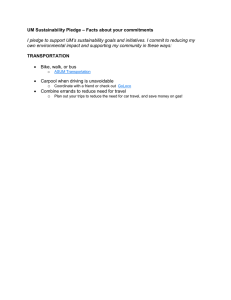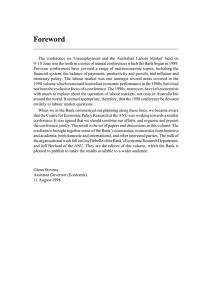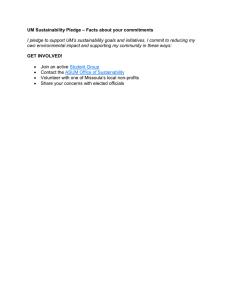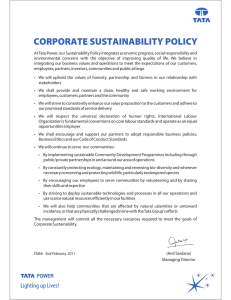Australian Business Pledge against Forced Labour Australian Brands against forced labour
advertisement
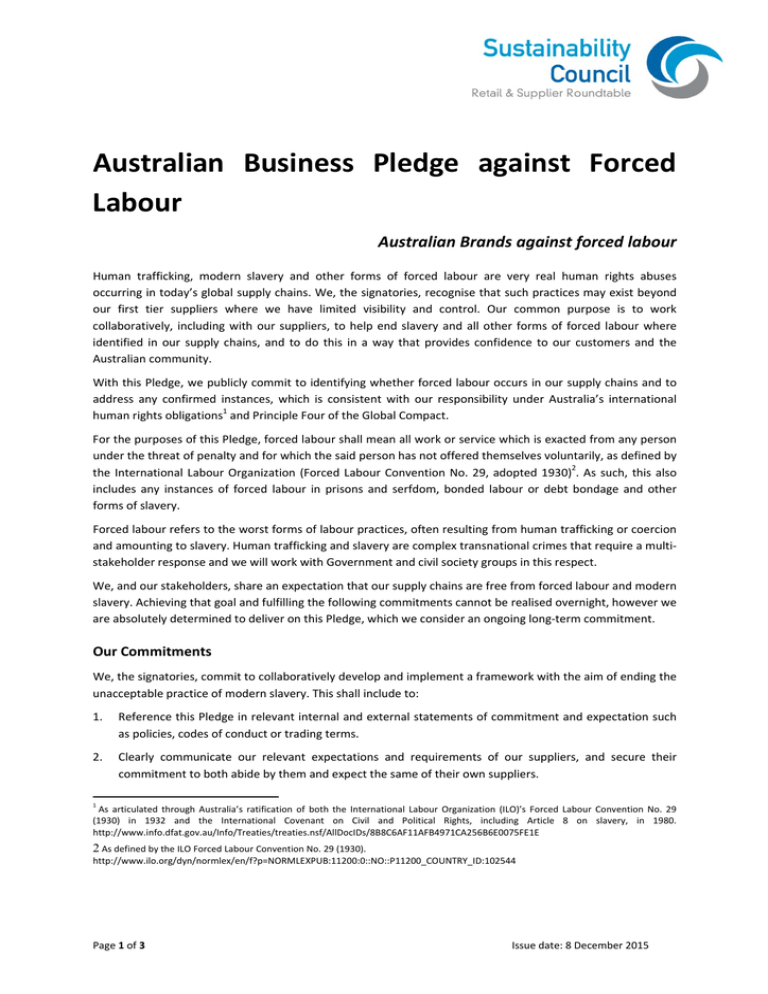
Australian Business Pledge against Forced Labour Australian Brands against forced labour Human trafficking, modern slavery and other forms of forced labour are very real human rights abuses occurring in today’s global supply chains. We, the signatories, recognise that such practices may exist beyond our first tier suppliers where we have limited visibility and control. Our common purpose is to work collaboratively, including with our suppliers, to help end slavery and all other forms of forced labour where identified in our supply chains, and to do this in a way that provides confidence to our customers and the Australian community. With this Pledge, we publicly commit to identifying whether forced labour occurs in our supply chains and to address any confirmed instances, which is consistent with our responsibility under Australia’s international human rights obligations1 and Principle Four of the Global Compact. For the purposes of this Pledge, forced labour shall mean all work or service which is exacted from any person under the threat of penalty and for which the said person has not offered themselves voluntarily, as defined by the International Labour Organization (Forced Labour Convention No. 29, adopted 1930)2. As such, this also includes any instances of forced labour in prisons and serfdom, bonded labour or debt bondage and other forms of slavery. Forced labour refers to the worst forms of labour practices, often resulting from human trafficking or coercion and amounting to slavery. Human trafficking and slavery are complex transnational crimes that require a multi‐ stakeholder response and we will work with Government and civil society groups in this respect. We, and our stakeholders, share an expectation that our supply chains are free from forced labour and modern slavery. Achieving that goal and fulfilling the following commitments cannot be realised overnight, however we are absolutely determined to deliver on this Pledge, which we consider an ongoing long‐term commitment. Our Commitments We, the signatories, commit to collaboratively develop and implement a framework with the aim of ending the unacceptable practice of modern slavery. This shall include to: 1. Reference this Pledge in relevant internal and external statements of commitment and expectation such as policies, codes of conduct or trading terms. 2. Clearly communicate our relevant expectations and requirements of our suppliers, and secure their commitment to both abide by them and expect the same of their own suppliers. 1 As articulated through Australia’s ratification of both the International Labour Organization (ILO)’s Forced Labour Convention No. 29 (1930) in 1932 and the International Covenant on Civil and Political Rights, including Article 8 on slavery, in 1980. http://www.info.dfat.gov.au/Info/Treaties/treaties.nsf/AllDocIDs/8B8C6AF11AFB4971CA256B6E0075FE1E 2 As defined by the ILO Forced Labour Convention No. 29 (1930). http://www.ilo.org/dyn/normlex/en/f?p=NORMLEXPUB:11200:0::NO::P11200_COUNTRY_ID:102544 Page 1 of 3 Issue date: 8 December 2015 3. Identify, assess and prioritise potential risks of forced labour [including slavery] in key risk regions and product categories in a way that is consistent in approach and underpinned by common criteria. 4. If actual incidents of forced labour should be identified, focus on effective collaboration with our suppliers, aid agencies and other relevant parties rather than exiting the supplier relationship. 5. Identify and implement opportunities to build the capacity of and collaborate with suppliers throughout the implementation of this Pledge. 6. Contribute to research that explores how to effectively increase transparency in the supply chain through tracing suppliers beyond the first tier in a way that reduces the risk of forced labour including modern slavery in supply chains. 7. Report, on an annual basis, on the progress of implementing this Pledge and publish a list of regions and categories considered at high risk of forced labour and case studies that contribute to the improved management of forced labour risks and thought leadership. 8. Collaborate, as signatories, on fulfilling each of the above commitments including through exploring opportunities for joint initiatives. Implementation of the Pledge To successfully implement and uphold our commitments as articulated in this Pledge, we acknowledge that we must work together and realise the potential of our joint capabilities, capacity and resources to find collaborative solutions. Tackling issues such as human trafficking, modern slavery and other forms of forced labour is not just beyond the individual abilities of any one company but, importantly, it is also beyond concerns of commercial sensitivity or competition. In recognition that the above commitments cannot be achieved overnight, upon signing of this Pledge, we will commence to develop and implement an Action Plan outlining how we will systematically translate our commitments into practice. To do so, we will work together and with others, such as relevant civil society organisations. After 12 months of signing this Pledge, we will publicly report on our Action Plan and the progress of its implementation. Understanding that human trafficking, modern slavery and other forms of forced labour are complex transnational crimes that require a multi‐stakeholder response, we will work with Government and civil society groups in meeting our commitments and welcome feedback on both our Pledge and our performance during its implementation. This feedback will help improve our approach and inform future reviews of this Pledge. Meeting our stakeholders’ and our own expectation that our supply chains are free from modern slavery is a challenge of global proportions; however, we are absolutely determined to deliver on our commitments and, in doing so, to contribute to a world free from the human suffering that is human trafficking, modern slavery and other forms of forced labour. Page 2 of 3 Issue date: 8 December 2015 The Retail and Supplier Roundtable (RSR) The Retail and Supplier Roundtable (R&SR) has been established by the Australia Food and Grocery Council, Woolworths and Coles as the first national forum for the Australian consumer goods industry. The R&SR is a CEO led cross‐industry forum to facilitate greater private and public sector collaboration across the food and grocery value chain. This is the first collaborative forum of its kind within Australia, and is modelled on the highly successful international Consumer Goods Forum. The R&SR is an Australian not‐for‐profit incorporated organisation that is designed and driven by its members to act upon, inform and influence significant matters that impact upon food and grocery products to Australian consumers. For further information please visit www.retailsuppliersroundtable.org.au. The R&SR Sustainability Council The Sustainability Council is a new consumer‐goods industry led forum to collaborate and lead the development of consistent environmental and social sustainability metrics and assessment tools. The Sustainability Council has been established, as one of the main pillars of the R&SR, to develop standardised and credible social, environmental and economic sustainability metrics and assessment tools for the Australian consumer goods industry. The Sustainability Council’s vision is to lead consumer goods industry collaboration on documenting and promoting consistent sustainability practices and continuous improvement across the supply chain. For further information please visit www.retailsuppliersroundtable.org.au. Page 3 of 3 Issue date: 8 December 2015

